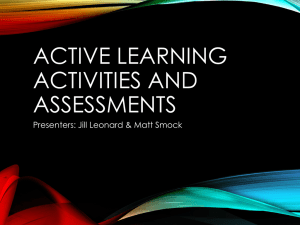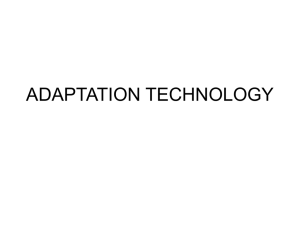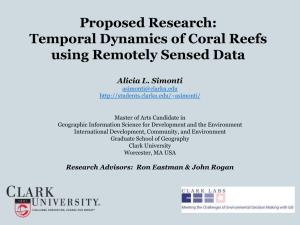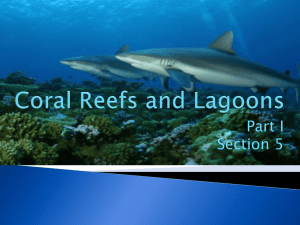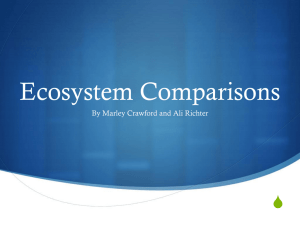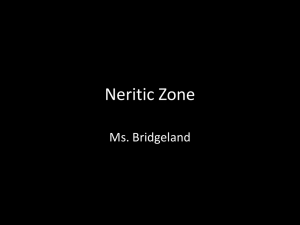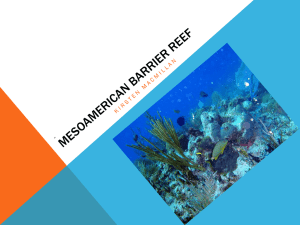The Global Action Plan for Coral Reefs
advertisement
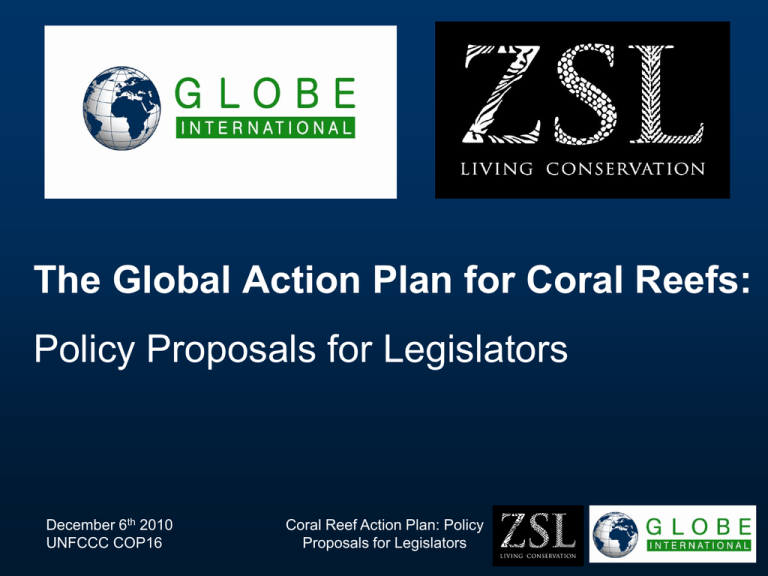
The Global Action Plan for Coral Reefs: Policy Proposals for Legislators December 6th 2010 UNFCCC COP16 Coral Reef Action Plan: Policy Proposals for Legislators What GLOBE does • Put legislators with a genuine interest in environmental issues together with experts in environmental science and related fields • Discussions are informal and free • Global Forum on Oceans, Coasts, and Islands have been working with GLOBE/ZSL to promote engagement of ocean-concerned parliamentarians – Ocean Parliamentarians Roundtable at the 5th Global Oceans Conference, May 2010 December 6th 2010 UNFCCC COP16 Coral Reef Action Plan: Policy Proposals for Legislators Knowledge exchange • It is critical that legislators understand the science behind the issues to have a full grasp of their significance. • Legislators learn from the experiences of other legislators as well as the scientists; share best practices. • Scientists gain insight into how government policy works, especially what barriers there may be to developing solutions to problems • Scientists also move from the focused perspective to a broader holistic approach to environmental issues at the global scale December 6th 2010 UNFCCC COP16 Coral Reef Action Plan: Policy Proposals for Legislators Marine ecosystems recovery plan • Marine fisheries • Tropical coral reefs • Coastal shelf marine ecosystems December 6th 2010 UNFCCC COP16 Coral Reef Action Plan: Policy Proposals for Legislators Marine ecosystems recovery plan • Marine fisheries • Tropical coral reefs • Coastal shelf marine ecosystems December 6th 2010 UNFCCC COP16 Coral Reef Action Plan: Policy Proposals for Legislators Coral Reefs - The most diverse marine ecosystems on Earth • Coral reefs - structurally complex and ancient ecosystems. • Cover 0.2% of the oceans surface but about a third of all marine species (some estimates ~ 9 million spp.) • Includes quarter of all marine fish species • 500 million people depend on reefs to some degree • Economic value: $172-375 billion p.a. December 6th 2010 UNFCCC COP16 Coral Reef Action Plan: Policy Proposals for Legislators Value of goods and services from reefs Mean Value US$ Ha / yr Food Raw materials Ornamental res. Climate regulation Moderation of extreme events Waste treatment Biological control Aesthetic information Tourism Cognitive development 470 400 264 648 25,200 42 4 7,425 79,099 2,154 (TEEB Climate Issues Update, 2009) December 6th 2010 UNFCCC COP16 Coral Reef Action Plan: Policy Proposals for Legislators Stresses leading to high vulnerability and low resilience to climate change impacts • Diseases, plagues and invasive species • Over fishing & destructive fishing practices • Sedimentation • Eutrophication and chemical pollution • Coastal development • Poorly managed tourism = Coral stress Contributory factors: • Increasing population, rising poverty • Poor capacity for management and lack of resources • Poor political will and governance December 6th 2010 UNFCCC COP16 Coral Reef Action Plan: Policy Proposals for Legislators Climate Change Effects on Coral Reefs CO2 Emissions = Rising SSTs & lowering of ocean pH December 6th 2010 UNFCCC COP16 Coral Reef Action Plan: Policy Proposals for Legislators Coral Bleaching Zooxanthellae (dinoflagellate algae) can provide all the corals energy requirements. These may be expelled when coral is under stress. Localised bleaching was caused by storms, disease, cyanide fishing, herbicides, changes in salinity and temperature……until the late 1970s. December 6th 2010 UNFCCC COP16 Coral Reef Action Plan: Policy Proposals for Legislators Mass Coral Bleaching Events • Coral bleaching events 1970s – 2008. Baker et al (2008) Estuarine, Coastal and Shelf Science 80: 435-471. • In 1998 a single mass coral bleaching event associated with severe El Niño killed 16% of the world’s coral reefs • 2010 bleaching worse than 1998 in some areas December 6th 2010 UNFCCC COP16 Coral Reef Action Plan: Policy Proposals for Legislators Ocean Acidification • Result is a reduction in the availability of aragonite, the form of calcium carbonate that corals use to build their skeletons • Change in pH not experienced for >20 million years • Beyond 450ppm coral reef ecosystems will collapse December 6th 2010 UNFCCC COP16 Coral Reef Action Plan: Policy Proposals for Legislators The Future of Coral Reefs Present December 6th 2010 UNFCCC COP16 2030-2040 Coral Reef Action Plan: Policy Proposals for Legislators Beyond 2050 Consequences of ecosystem collapse • Loss of Biodiversity • Loss of fisheries, income and food security • Serious impacts on coral reef nations December 6th 2010 UNFCCC COP16 Coral Reef Action Plan: Policy Proposals for Legislators Bleak Future for Coral Reefs • 19% of coral reefs have been lost globally with a further 35% under immediate threat (excluding climate change effects) • Climate change impacts will move reefs into a state of collapse globally when CO2 levels go beyond 450ppm. At a point between 2050 - 2070 the destruction of coral reefs will very likely be irreversible given the current lack of agreement on emissions December 6th 2010 UNFCCC COP16 Coral Reef Action Plan: Policy Proposals for Legislators Barriers to Effective Management • Lack of recognition within many levels of government of the social and economic importance of coral reef ecosystems • Lack of political will • Major capacity gaps in governance and enforcement • Establishment of sustainable national level funding is hindered by the need for the introduction of strong legislation Legislators can play an important role in removing these barriers and making coral reef ecosystembased management a top political priority December 6th 2010 UNFCCC COP16 Coral Reef Action Plan: Policy Proposals for Legislators Global Action Plan for Coral Reefs • Objective: To provide international legislators, policymakers and managers with a clear set of recommendations to build resilience in coral reef ecosystems and in the communities/stakeholders that rely on them. December 6th 2010 UNFCCC COP16 Coral Reef Action Plan: Policy Proposals for Legislators The Marine Ecosystems Recovery Plan II GLOBE Action Plan for Coral Reefs • Address direct human pressures - Sustainable management of fisheries - Management of watersheds and water quality - Increase area and effectiveness of Marine Protected Areas • Increase effective governance, management capacity and awareness - Increase levels of effective governance and management - Increase environmental education and awareness • Financing and coordination of the GLOBE Action Plan for Coral Reefs - Examine current and future funding mechanisms - Coordination of action at national and international levels December 6th 2010 UNFCCC COP16 Coral Reef Action Plan: Policy Proposals for Legislators Global Action Plan for Coral Reefs Addressing Direct Human Pressures: • Sustained coordinated action to significantly reduce all direct human pressures in order to: – manage fisheries sustainably; – improve the management of watersheds, water quality and reduce pollution; – increase marine protected area coverage and effectiveness. • 30% MPA coverage of the world's coral reefs by 2020. December 6th 2010 UNFCCC COP16 Coral Reef Action Plan: Policy Proposals for Legislators Global Action Plan for Coral Reefs Increasing Governance, Management Capacity and Awareness: - Increase levels of effective governance and management Effective management strategies for coral reef governance and enforcement are designed and implemented at national and regional levels. - Increase environmental education and awareness Environmental education and awareness programmes are implemented within both national education systems and through outreach programmes for all coral reef nations. December 6th 2010 UNFCCC COP16 Coral Reef Action Plan: Policy Proposals for Legislators Financing Coral Reef Action 1. Donor-based funding: Climate-change related (UNFCCC Adaptation fund; International Climate Initiative) Watershed management and pollution related (GEF International Waters Programme) Biodiversity-related funding (GEF – management & capacity building) Development-related funding (e.g. World Bank) 2. Market-based funding (Payments for ecosystem services; polluter pays principle, trust funds, environmental bonds, trust funds, private sector partnerships, user fees) December 6th 2010 UNFCCC COP16 Coral Reef Action Plan: Policy Proposals for Legislators GLOBE Coral Reef Action Plan • Action Plan buys time for adaptation of coral reef ecosystems. • Only agreement to rapidly and dramatically cut emissions will save coral reef ecosystems. Full action plan at: www.zsl.org/globe December 6th 2010 UNFCCC COP16 Coral Reef Action Plan: Policy Proposals for Legislators Thanks to all those who helped to develop and refine the Action Plan for Coral Reefs including: Boston University, Caribsave, ClientEarth, Conservation International, the Convention on Biological Diversity Secretariat, Coral Cay Conservation, Global Coral Reef Monitoring Network, International Coral Reef Initiative, International Coral Reef Action Network, International Union for the Conservation of Nature, James Cooke University, London School of Economics, Marine Conservation Society, SeaWeb, The Nature Conservancy, United Nations Environment Programme, UNEP World Conservation Monitoring Centre, University of Bedfordshire, University of Hong Kong, Global Change Institute - University of Queensland, Warwick University, Wildlife Conservation Society, The World Bank, The WorldFish Center and ZSL / GLOBE colleagues. Joe Appiott, Global Forum on Oceans, Coasts, and Islands: email: jappiott@udel.edu Contact:th Presentation title, edit in December 6 2010 Coral Reef Action Plan: Policy header and footer (view menu) Dr. Simon Harding; email: simon.harding@ioz.ac.uk UNFCCC COP16 Proposals for Legislators April 13, 2015 Page 23

